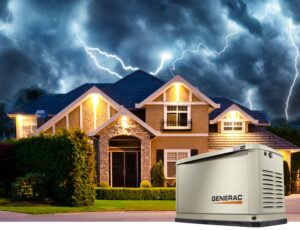
Power outages can strike at any time, and when they do, they can disrupt more than just your daily routine. Whether it’s caused by a severe storm, utility failure, or infrastructure issues, losing power means losing the systems that keep your home safe, functional, and comfortable.
At Maeser Master Services, we’ve spent over five decades helping homeowners in our community prepare for the unexpected. Choosing the right generator isn’t just about buying a piece of equipment—it’s about protecting your home, your loved ones, and your peace of mind.
This guide breaks down everything you need to know when selecting a home generator. From sizing and fuel types to installation and maintenance, we’re here to walk you through the process—with the same integrity and care that’s been our signature since 1974.
Start with What You Need to Power
Every household has different priorities during a blackout. Some families just want to keep essentials running; others need a whole-home solution that lets life go on without interruption.
Basic Backup
If you’re only looking to keep key items like the refrigerator, sump pump, lights, or Wi-Fi online, a smaller generator may be sufficient. These options offer an affordable way to maintain safety and basic comfort during short-term outages.
Full-Home Coverage
Want to keep your HVAC system, kitchen appliances, home office, and security system powered up? A whole-home generator offers a seamless experience, automatically taking over when the power goes out—no manual startup or hassle required.
No matter what your comfort level or budget is, Maeser’s comprehensive home services ensure we match you with the right fit—because we believe in doing what’s right for you, not what’s easy for us.
Know Your Fuel Options
A generator is only as reliable as its fuel source. Let’s break down the most common options and how to choose what’s best for your home.
Natural Gas
Hooked up to your existing gas line, this fuel source is convenient and essentially limitless.
- Pros: No need for refueling, cleaner burning
- Best for: Homes with existing natural gas access
Propane
Propane is a dependable choice, especially in areas without gas infrastructure.
- Pros: Long shelf life, clean combustion
- Best for: Rural homes or those without utility gas
Diesel
Diesel generators deliver high power and durability—often used in commercial or high-demand residential settings.
- Pros: Fuel-efficient, great for larger loads
- Best for: Larger homes or critical systems
At Maeser, our technicians don’t just install systems—they bring a legacy of expertise to every consultation, helping you weigh pros and cons with clarity and confidence.
Right-Size Your Generator
Choosing the right size generator is critical. Go too small, and you risk overloading it. Too big, and you’re paying for capacity you don’t need.
We consider both:
- Running watts: The ongoing power needs of your appliances
- Starting watts: The temporary surge when things like your AC unit kick on
Typical Ranges:
- Essential use: 5,000–7,500 watts
- Partial-home coverage: 8,000–12,000 watts
- Full-home systems: 12,000–22,000+ watts
Don’t worry if those numbers sound confusing. We take the guesswork out by conducting a professional home load assessment, so you get a solution that’s smart, safe, and cost-effective.
Installation: Why It Pays to Go Pro
Installing a standby generator isn’t a DIY job. It requires precise electrical work, safe fuel integration, and strict code compliance.
With Maeser, you can count on:
- Proper permitting and inspections
- Seamless integration with your electrical panel and transfer switch
- Full safety checks and system testing
- Respectful, tidy service from start to finish
We back our work with our customer-first commitment and treat every job like it’s happening in our own home. Because with Maeser, it’s not just about getting the power back—it’s about trusting the people who make it happen.
The Role of Maintenance
Even the best generator can’t do its job without regular maintenance. That’s why Maeser offers preventive care to keep your system ready for action.
Our service includes:
- Oil and filter changes
- Battery and connection inspections
- Load testing
- Software updates and diagnostics
With trusted local service rooted in the community, you’ll never wonder who to call if your generator needs attention. And yes, the rubber ducky is still watching out for you—one service call at a time.
Why Invest in a Generator?
A standby generator isn’t just about convenience—it’s about confidence and control. Here’s what it brings to your home:
- Automatic Backup: Seamless switch to generator power within seconds of an outage
- Protection for Appliances: Keeps sump pumps running, prevents food spoilage, and more
- Comfort During Storms: Maintain heating or cooling when you need it most
- Work-from-Home Ready: Avoid disruptions to your home office
- Peace of Mind for Medical Equipment: Keep critical devices functioning safely
- Added Home Value: A backup generator is a smart resale feature
And when it’s installed by a name your neighbors have trusted for 50+ years, you can rest easy knowing you’re in good hands.
Frequently Asked Questions
How much does it cost to install a home generator?
Installation costs vary depending on system size and complexity. On average, homeowners spend between $6,000 and $15,000, including the unit and installation. Maeser offers transparent pricing—you’ll know the cost before work begins.
Can I power my whole house with a generator?
Yes. With the right generator and setup, we can configure whole-home systems to power everything from HVAC to major appliances.
How long can a generator run?
- Natural gas: As long as your gas supply continues
- Propane/diesel: Typically 24–72 hours depending on fuel tank size and usage
We’ll help plan your system for the expected duration of outages in your area.
How often does a generator need maintenance?
Most standby systems need service once a year or every 100–200 hours of use. We recommend an annual check-up to keep everything in peak condition.
What’s the difference between a portable generator and a standby generator?
Portable generators require manual setup and fuel refills. Standby generators are permanently installed, turn on automatically, and are safer, quieter, and more convenient—especially for whole-home use.
Power Your Home with Confidence
When the power goes out, don’t leave your home—and your peace of mind—in the dark. With Maeser Master Services, you get more than just backup power. You get a partner you can count on, built on trust, experience, and a commitment to doing right by our customers.
We’ve been serving this community since 1974. We’re your neighbors, your experts, and yes—we’re the folks with the rubber ducky. Because with Maeser, every service call comes with The Ducky Difference: integrity, reliability, and care that’s second to none.
Ready to find the right generator for your home?
Let’s make sure you’re never left in the dark again.



